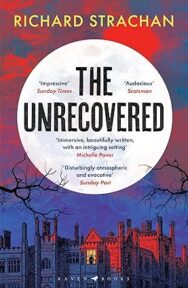‘There are plenty of writers who write competently about horror and the supernatural but who lack the descriptive skill to animate everyday reality or handle their characters’ psychological complexity. Strachan can do both.’
David Robinson is impressed with Richard Strachan’s debut novel, The Unrecovered, a gothic literary thriller that keeps readers guessing.
The Unrecovered
By Richard Strachan
Published by Raven Books
It’s March 1918, and in Flanders, the Germans are breaking through British lines. Within a week or so, the casualties will arrive at Ruttinglaw House, a mansion near South Queensferry converted into a military hospital. Volunteer nurse Esther Worrell, widowed at the start of the war, will be among those taking care of them.
One of the patients is a local man, Captain McQuarrie. ‘Our first from the Palestinian front,’ the Medical Officer tells Esther as she follows him on his rounds. Bayonet wound, says the note on the bedstead, though the bandaged hole in his chest seems a bit too wide for that. She fills the glass of water by his bedside and they move on.
Already, though, I’ve cheated, the way all reviewers cheat. It’s in the nature of the job: we’re looking back, re-viewing, and inevitably concentrating on the characters who will figure later on. But at the start of The Unrecovered, Richard Strachan tells us so much more: not just about Esther, but the hopes and fears of her nursing colleagues; not just about Captain McQuarrie but gossipy case notes on all the other wounded soldiers on the morning round; not just about the makeshift hospital but also about the half-ruined castle across the fields the medical officer wants to requisition to cope with imminent flood of casualties. Comprehensively imagined and carefully described, this is a convincing piece of stage-setting.
Gallondean, the gothic pile across the fields from the hospital, is the kind of place you might expect to find in a supernatural horror novel, all crumbling masonry, rotting carpets, damp wooden floors, and secret chambers with their own grim mythologies. Its grounds are similarly cursed, not least the rocky outcrop on the nearby coast called Hound Point. Centuries ago, at the exact moment when the laird of Gallondean died, his faithful dog was said to have howled in mourning – even though his master was many miles away at the time, and this happens whenever any subsequent laird dies. Preposterous, you might think – except that you’ll find a version of this story in every guide book you’ll ever read about Hound Point, the very real headland on the Dalmeny Estate a mile east of the Forth Bridge.
Jacob Beresford is the new laird of Gallondean, and he has just arrived from India to take ownership. The nurses at neighbouring Ruttinglaw can’t work out whether he reminds them more of Dracula or Heathcliff, but the medical officer knows a tubercular patient when he sees one. More than his health, though, Jacob is obsessed with getting to the bottom of that centuries-old legend about a tyrannical owner of the castle whose son went on a Crusade to the Holy Land after his death. There’s a statue of this knight – and his faithful dog – in the hospital grounds, though when one of the nurses sleepwalks past it, it doesn’t seem to be there any more.
Sorry: I’ve done it again. Because that was just a silly dream one of Esther’s colleagues mentioned to her, wasn’t it? Just a bit of chitchat between the nurses as they went about the far more important task of looking after their patients, feeding the man who had come back from the front without any hands, talking about the production of Peter Pan that the wounded troops are planning to put on to raise their morale, or about the snared animals whose mutilated bodies the gamekeepers (presumably) have left in the nearby woods. Yet as readers, we’re always trying to guess the path the novelist is taking us on, and the dream-disappeared statue makes us suspicious. A red flag, surely?
Except that in The Unrecovered these coincidences, false trails, and people who remind the main characters of others who know secrets about them, positively abound. So many, in fact, that they’re not red flags at all. Yet if a red flag is something that stops you reading, what we have here is the opposite: an encouragement to read on, if only to find out which clues turn out to be true and which ones false.
I can’t say much more without spoilers, but I will mention a key fact – one I’d completely forgotten – that is grounded in history just as surely as the novel’s Hound Point (and come to that, Mons Hill) are grounded in West Lothian’s geography. When Jerusalem fell to General Allenby’s British-led troops in December 1917, he became the first Christian for centuries to control the city. Does that help you join any plot dots? Can you work out what was likely to have caused that wound in Captain McQuarrie’s chest?
(Don’t worry: neither could I.)
But I’ve kept the most important thing about Richard Strachan’s writing to the end. There are plenty of writers who write competently about horror and the supernatural but who lack the descriptive skill to animate everyday reality or handle their characters’ psychological complexity. Strachan can do both.
I’ll give you an example. When we are first introduced to Esther, we know that she is married, but little more. Carefully, Strachan drip-feeds key facts about her: we learn, for example, that she is a would-be poet and is passionate about Browning, whom she defends against McQuarrie’s accusations that he is both old-fashioned and obscure. ‘It’s just that he lets his information unfold more gradually,’ she says, but that’s true of Strachan’s portrait of her too: she’s not just married, but widowed; not just recently, but early in the war, when his ship was sunk. Her honeymoon was in Florence in July 1914, and naturally she wanted to see Elizabeth Barrett Browning’s tomb in the English Cemetery there, but her husband wasn’t bothered and didn’t even attempt to hide his boredom and frustration. It was a hot summer’s day and he was forever complaining about how far away the cemetery was, and insisted on having a glass of wine at each cafe they passed. There were a lot of cafes….
You’d expect to find a scene like this – pivotal to the heavily literary and somewhat over-ornate plot, as it happens – in, say, a short story by William Trevor or Bernard MacLaverty rather than genre fiction. But Strachan’s talents for descriptive writing are equally evident even when – as in a superlative scene set in the hills of Judea at the end of the book – he is handling an all-out action sequence. Like Iain Sinclair, who calls this ‘a formidable and deeply crafted nightmare,’ I was hugely impressed.
I live in the same city (Edinburgh) as Strachan but hadn’t heard of him before, though a quick internet search reveals that he is a former bookseller and has already penned several novels for Games Workshop’s Black Library imprint. For none of these, though, has he had a book launch although he has just had one for this, his literary debut. And as debuts go, it’s a very assured one indeed.
The Unrecovered by Richard Strachan is published by Raven Books, priced £16.99














